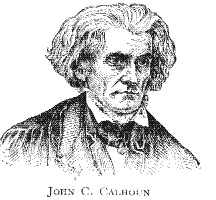

United States History 17A
A Revised American Party System
The National Republican Party of the 1820s was
transformed into the Whig party in the early 1830s. Northern manufacturers
and supporters of the Bank were drawn to this new party. But, strangely,
so were southern Democrats. This was a result of their anger at Jackson
for his opposition to CalhounÕs theory of nullification. As a Democrat,
they believed that Jackson should have been hostile to the new tariffs,
as was Calhoun. They believed that Jackson should have supported Calhoun
instead of opposing him.
The reason that Jackson did not support Calhoun
was more personal than theoretical. Even though Calhoun had been elected
with him in 1828 as his Vice-President, Jackson hated Calhoun for a number
of reasons. The most recent had to do with Calhoun's wife and the wife
of Jackson's Secretary of War, John Eaton. Before she married John Eaton,
Peggy O'Neil, a married woman, had had an affair with him. When her husband
died or committed suicide, no one seemed to know which, she married John.
Following their marriage, Calhoun's wife and the other secretaries' wives
refused to socialize with the Eatons at any of the official Washington
functions. Jackson was furious over this. He identified strongly with Peggy
Eaton because his own late wife, Rachel, had been a similar victim of this
social ostracism because she had been married once before she married Jackson.
Jackson blamed this hostility toward his wife as a contributing factor
to her early death. He saw the Calhouns as the ringleaders who were perpetuating
this vicious behavior toward Peggy Eaton. In retaliation for their snubs
of the Eatons, Jackson forced his entire cabinet to resign in the summer
of 1831. Calhoun, himself, resigned the following spring.
Thus, while Jackson, as a Democrat, was hostile
to the tariff, he was even more hostile to Calhoun, for personal reasons.
In the crisis over nullification in 1832, therefore,Jackson abandoned his
party's platform to oppose Calhoun. However, when he did, many of the Democratic
party leaders abandoned him in return and joined the Whig Party.
The Whigs, then, were a curious combination
of people north and south who, as a group, both supported and opposed the
Bank, and who both supported and opposed the tariff. What they had in common,
however, was their hatred of Andrew Jackson. The Whigs certainly proved
the old adage that 'politics makes strange bedfellows'.
The Whigs, however, survived as a viable party
into the 1850s and, ironically, because of their north/south coalition,
acted as a safety valve to reduce the mounting sectional tension over the
growing problems of slavery expansion. When the Whig party finally collapsed
in 1854 - importantly, over the issue of slavery expansion - the two parties
that emerged were mostly sectional (north/south) parties and unwilling
to compromise over this issue. Thus the splitting of the Whig Party in
1854 foretold the eventual attempt to split the Union only a few years
later in 1861.
47. Of whom was the Whig Party composed? What did they
disagree on? What did they have in common?
48. Did this colation of 'strange bedfellows' serve any national
purpose?

 Return
to Study Guide #8
Return
to Study Guide #8
 Revised
March 27,2000
Revised
March 27,2000
by Tom Gallup, e-mail address: [email protected]
West Valley College
http://www.westvalley.edu/wvc/ss/gallup/gallup.html



![]() Revised
March 27,2000
Revised
March 27,2000